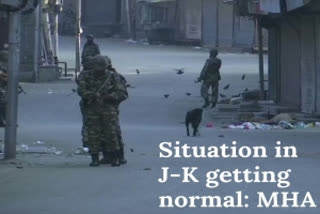New Delhi: Top Union Home ministry officials on Friday conveyed to a parliamentary panel that the situation in Jammu and Kashmir is getting normal and detained political leaders, including former chief ministers, will be released but gave no time-frame for it, sources said.
Union Home Secretary Ajay Kumar Bhalla and Additional Secretary in the Home Ministry Gyanesh Kumar and other ministry officials briefed the parliamentary standing committee on Home Affairs, chaired by senior Congress leader Anand Sharma, on the situation in the union territories of Jammu and Kashmir, and Ladakh.
Members of the Lok Sabha and Rajya Sabha quizzed top government officials on the detention of political leaders, particularly three-time former chief minister and Srinagar MP Farooq Abdullah, who was charged under the controversial Public Safety Act on September 17.
Home ministry officials told the parliamentary panel that those detained under the PSA can challenge their detention in a designated tribunal. If not satisfied with the order of the tribunal, they can move the High Court. Abdullah is the only political leader detained under the PSA in Kashmir.
Sources said the MPs were also agitated about the prolonged detention of Abdullah's son Omar Abdullah as well as PDP chief Mehbooba Mufti, both former chief ministers, who have been under detention since August 5, when the Centre withdrew Jammu and Kashmir's special status under Article 370 and bifurcated it into two union territories.
Responding to questions on the release of the detained political leaders, Bhalla and his team of officers conveyed that some had been released and others will be freed gradually but refrained from giving any timeline, sources said.
The Home Secretary, sources said, told the MPs that the situation in the UT of Jammu and Kashmir is getting normal, schools are open and the apple trade is going on, sources said.
The MPs also raised the issue of curbs on the internet in the Valley since August 5. Home ministry officials, it is learned, said the restrictions were imposed as the internet could be used by terrorists for subversive activities as well as by anti-social elements to spread rumours.
